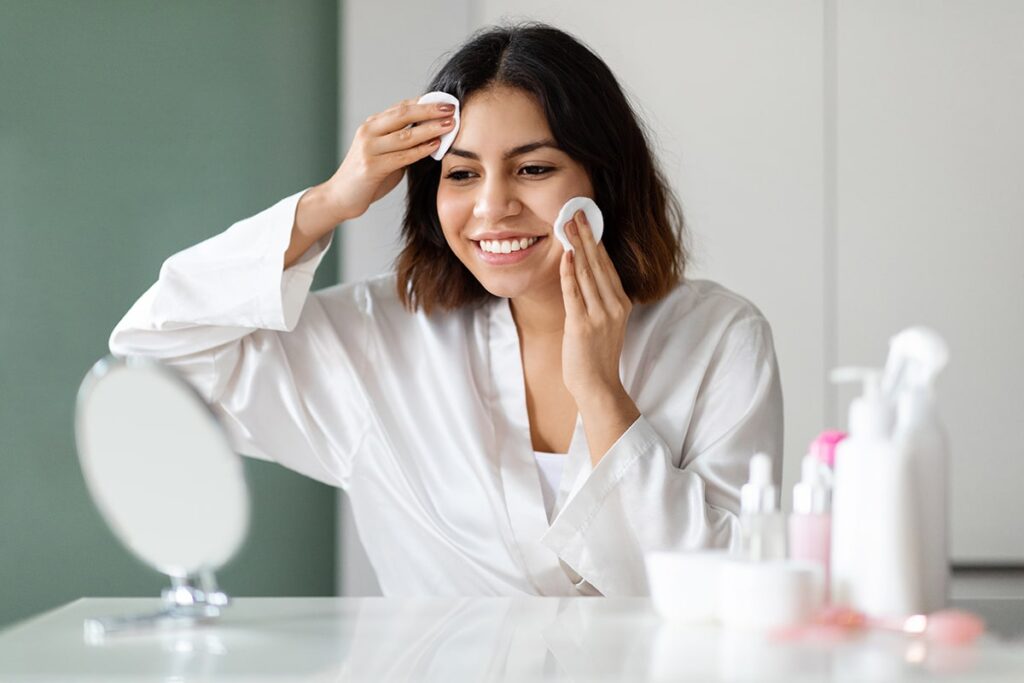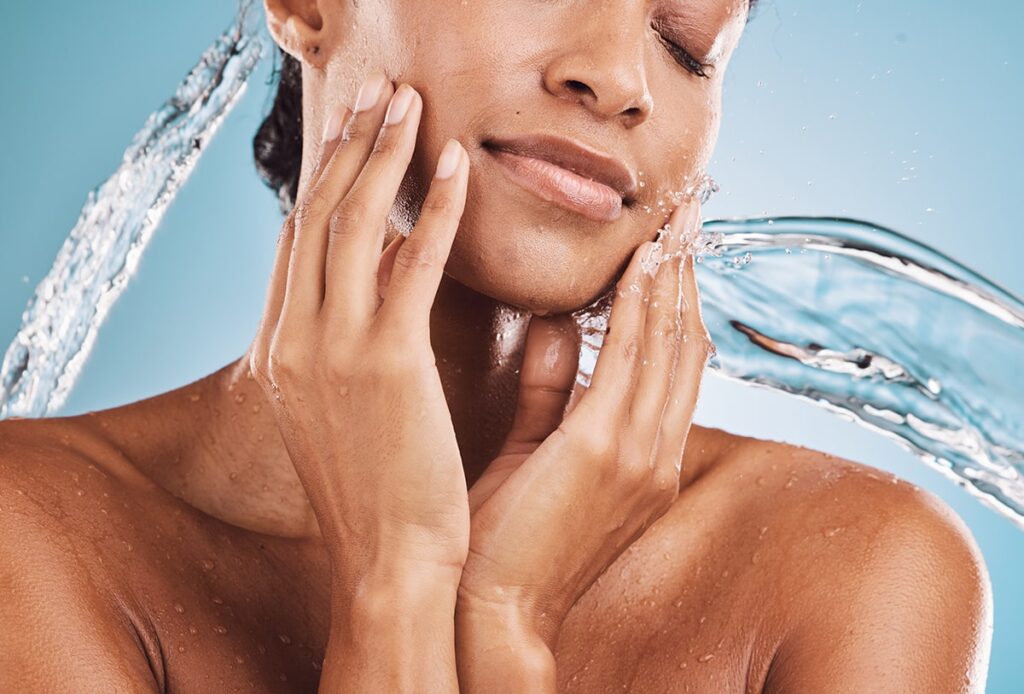Who doesn’t want to have happy, glowing skin? Beautiful, radiant skin not only makes us look and feel better, but it’s also a sign of good health. Nonetheless, to achieve and maintain such a glowing complexion, we must put in the effort and cater to our skin’s needs.
With so many skincare products and routines available, it can be overwhelming to figure out what works best for your skin. That’s why I’ve compiled the ultimate guide to happy, glowing skin, featuring the top 12 tips and secrets as well as a skincare routine to help you attain a healthy, radiant complexion.

Address Inflammation and Strengthen Your Skin Barrier
Inflammation can be harmful to skin health and can occur due to a variety of factors, including immune system dysfunction, allergies, infections, and exposure to irritants like heat and sun[1][2][3]. Inflammatory skin conditions such as eczema, psoriasis, and dermatitis can cause flaking, itching, and discomfort[4][5].
Inflammation can be harmful to your skin’s health, leading to issues like dry skin, oily skin, and various skin diseases so it’s essential to address the factors that contribute to inflammation. These include an unhealthy diet, leaky gut, poor blood sugar regulation, dehydration, lack of sleep, hormonal imbalances, toxin build-up, high stress, and an absence of mindfulness practices.
By addressing these issues, you can improve your skin’s health and achieve a glowing complexion. Maintaining a strong skin barrier is essential for preventing inflammation and achieving a natural glow. To strengthen your skin barrier, follow a balanced diet, stay hydrated, get enough sleep, and manage stress levels. Using products containing ingredients such as fatty acids and glycolic acid can also help improve your skin barrier repair effects.

Support Your Digestive System
A healthy digestive system is crucial for radiant skin. Some ways to support your digestion include:
Chewing each mouthful 20 times: This helps to break down your food into smaller particles, making it easier for your body to digest and absorb the nutrients.
Eating warm foods: promotes circulation and stimulates digestion.
Increasing your intake of vegetables for prebiotic benefits: This helps to feed the beneficial bacteria in your gut. See why my article about gut health to understand why this is important.
Consuming probiotic-rich foods: A few examples include sauerkraut, organic kefir, and kimchi.
Boosting your intake of antiviral and antibacterial foods: Example of these include pumpkin seeds, garlic, ginger, cayenne, lemon, grapefruit, and cloves: These foods will help to boost your immune system and also promote the growth of beneficial bacteria in your gut.

Incorporate Natural Ingredients for Glowing Skin
A healthy diet plays a significant role in achieving naturally glowing skin. Incorporate high vibration foods, fresh fruits, vegetables, healthy fats, and lean proteins into your meals to nourish your skin from the inside out. Natural ingredients like aloe vera, vitamin C, and olive oil can work wonders in promoting healthy and glowing skin. Aloe vera can soothe irritated skin, while vitamin C is known for its skin-brightening properties. Olive oil, rich in natural oils and vitamin E, can help moisturize dry skin and improve skin texture. Using a vitamin C serum in your skincare routine can boost your skin’s radiance and lighten dark spots.

Enhance Your Diet for Glowing Skin
The food you eat has a significant impact on your skin’s health and appearance. Stay away from unhealthy diets and aim to eat a balanced diet that includes plenty of fruits, vegetables, and whole grains. Avoid consuming too much saturated fat, which can clog your pores and cause acne breakouts.
Incorporate foods rich in polyphenols, vitamins, minerals, and antioxidants to support healthy skin. Vitamin C, found in citrus fruits and berries, can improve your skin’s glow. Foods high in fatty acids, such as avocado, nuts, and seeds, help maintain skin’s radiance. Cod liver oil and saturated fats found in coconut oil can also contribute to a lit-from-within glow.
Balance Your Hormones
Hormonal imbalances can lead to blemished skin. Adopting a low-GI diet with clean protein sources like wild fish, organic vegetables, and healthy fats from avocado, olives, and coconut can help balance your hormones and promote healthy skin.

Exfoliate to Remove Dead Cells and Improve Skin Texture
Regular exfoliation is vital for maintaining a smooth, even complexion. It removes dead skin cells, unclogs pores, and stimulates cell renewal. There are two primary types of exfoliation:
Physical exfoliation: Involves the use of scrubs, brushes, or textured cleansing tools.
Chemical exfoliation: Employs acids (such as AHAs, BHAs, and PHAs) to dissolve dead skin cells.
Choose the exfoliation method that best suits your skin type and needs, and incorporate it into your routine 1-3 times per week, depending on your skin’s sensitivity.

Keep Your Skin Hydrated
Drinking enough water is essential for keeping your skin healthy and hydrated. Aim to drink at least 8 glasses of water a day to help flush out toxins and keep your skin looking and feeling its best.
Also you can use oil-free moisturizers and natural ingredients like coconut oil to absorb moisture and keep your skin hydrated. Face masks containing raw milk or a smooth paste made from natural ingredients can also help maintain your skin’s moisture levels.
Maximize Your Body's Ability to Detoxify
Supporting your liver, kidneys, gallbladder, spleen, and lymphatic system is crucial for detoxification and achieving glowing skin. Activities like trampolining and skin brushing can improve lymph flow and promote skin health.

Let Your Skin Sweat it Out
Sweating helps remove toxins, bacteria, and heavy metals from your skin while reducing inflammation. Remember to wash your skin before exercising to prevent clogged pores and acne.
Stress Management
High stress levels can reduce blood flow to your skin, hindering its ability to heal. Practicing mindfulness, gratitude, visualizations, and affirmations can help manage stress and promote a radiant glow.

Get Enough Sleep
Sleep is essential for skin health as it supports blood flow, healing, repair, and collagen production. Aim for seven to nine hours of quality sleep each night to give your skin time to repair and regenerate. Lack of sleep can affect your skin’s health, leading to dark circles, puffiness, and dullness.
Experiment with Natural Remedies
Choose natural makeup and skincare products, and opt for non-toxic household cleaners and laundry detergents. Reducing your exposure to harsh chemicals can improve your skin’s health and radiance.
I recommend scanning all your cosmetics with Yuka, it’s a free and ad-free independent app (with no influence from outside brands or manufacturers) that evaluates the quality of your foods and cosmetics, giving them a score from 1 to 100.

Identify Your Skin Type
There are several ways to identify your skin type. One way is to observe how your skin feels and looks throughout the day. If your skin is shiny throughout, you likely have oily skin. If it feels tight and is flaky or scaly, you likely have dry skin. If the shine is only in your T-zone, you probably have combination skin. If your skin feels hydrated and comfortable, but not oily, you likely have normal skin[6][7].
Here are the five common skin types:
Normal: Well-balanced, neither too oily nor too dry.
Oily: Excess oil production, prone to enlarged pores and breakouts.
Dry: Insufficient oil production, often tight, flaky, and dull.
Combination: A mix of oily and dry areas, typically an oily T-zone with dry cheeks.
Sensitive: Easily irritated, prone to redness and inflammation.
To identify your skin type, observe your skin in its natural state, without makeup or products, and assess the oiliness, dryness, or sensitivity.

Skin care Routine for Glowing Skin
Following a consistent skin care routine is one of the most important steps for achieving glowing skin. Cleanse, exfoliate, moisturize, and use products specifically designed for your skin type to maintain your skin’s health and glow.
Regularly incorporating face masks and serums into your routine can also help enhance your skin’s appearance.
Cleanse
Cleansing is the first and most essential step in any skincare routine. It removes dirt, oil, makeup, and impurities from the skin’s surface, allowing your skincare products to penetrate more effectively. Choose a gentle, pH-balanced cleanser that suits your skin type and doesn’t strip your skin of its natural oils. Gently massage the cleanser onto your face in circular motions and rinse thoroughly with lukewarm water.
Exfoliate
Exfoliating helps remove dead skin cells that can accumulate on the skin’s surface, making it look dull and dry. It also helps with improving blood circulation, which can promote skin cell regeneration and improve skin texture for a healthy glow.
Make sure to choose the right exfoliator for your skin type and avoid over-exfoliating, which can strip the skin of its natural oils and cause irritation. Look for gentle exfoliators that contain natural ingredients like fruit enzymes or finely ground grains, and use them no more than once or twice a week.
Tone
Next, use a toner to help balance your skin’s pH levels and remove any remaining impurities. Look for a toner that contains gentle exfoliating acids like glycolic or lactic acid, which can help to improve skin texture and boost radiance.

Serum
Apply a serum containing active ingredients like vitamin C, hyaluronic acid, or niacinamide to help brighten, hydrate, and protect your skin. Serums are lightweight and penetrate deeply into your skin, delivering potent ingredients directly to your cells and help your skin glow!
Eye Cream
Apply a small amount of eye cream to your under-eye area using your ring finger. Gently tap the cream in, being careful not to tug or pull at the delicate skin around your eyes. Eye creams can help to reduce puffiness, dark circles, and fine lines.
Moisturize
Use a moisturizer that is suitable for your skin type and contains ingredients that nourish and hydrate your skin. Apply the moisturizer in upward, circular motions, focusing on any areas that tend to be drier, like your cheeks or forehead.
Shield Your Skin with Sunscreen
Sun damage is a leading cause of premature aging, skin cancer, skin aging and dark spots. Protect your skin from excesive sun exposure by wearing a broad-spectrum sunscreen with at least SPF 30.
Weekly treatments
Consider incorporating a weekly treatment into your skincare routine, like a face mask or a gentle chemical peel. These treatments can help to boost your skin’s radiance and improve its overall health and appearance.
Remember, consistency is key if you want to achieve glowing skin! Stick to your routine and give it time to work its magic, and don’t forget to nourish your skin from the inside out by drinking plenty of water, eating a healthy diet, fasting, and getting enough rest. See my daily routine here and how to optimize your metabolic health with CGM here.

Coaching Sessions
I am currently offering one-on-one coaching sessions to help individuals who may be facing challenges in achieving their goals independently. My goal as a coach is to guide and support you in every step of your journey, while also holding you accountable for the actions you take towards achieving your desired outcomes.
Whether you want to improve your health and wellness, establish better habits, or achieve personal and professional growth, I can provide you with personalized attention, a customized approach that suits your unique needs, and the necessary tools and motivation to help you reach your full potential and transform your life.

Conclusion
In conclusion, achieving healthy, glowing skin is a journey that requires patience, dedication, and a consistent skincare routine. Remember that taking care of your skin is not just about achieving a certain look or aesthetic. By protecting your skin from the sun, eating a healthy diet, staying hydrated, and getting enough rest, you are not only improving your skin’s appearance but also supporting your body’s overall health. Everyone’s skin is unique, and what works for one person may not work for another. That being said, the tips and tricks outlined in this article can serve as a great starting point for anyone looking to improve their skin’s health and appearance.
FAQ
You can address inflammation and strengthen your skin barrier by incorporating anti-inflammatory ingredients into your skincare routine, such as green tea extract, aloe vera, and niacinamide. Additionally, avoid using harsh products that can strip your skin's natural oils and irritate your skin.
Some ways to support your digestive system for better skin health include eating a balanced diet rich in fiber and probiotics, staying hydrated, and avoiding processed foods and excess sugar. Chewing your food thoroughly and eating slowly can also aid digestion and promote healthy gut bacteria.
Some natural ingredients to incorporate into your skincare routine for glowing skin include vitamin C, hyaluronic acid, aloe vera, green tea extract, and rosehip oil. These ingredients can help to brighten, hydrate, and protect your skin.
Eating a diet rich in fruits, vegetables, and whole grains can help enhance your skin's glow. Additionally, incorporating healthy fats like avocado, nuts, and fatty fish can help improve skin hydration and reduce inflammation.
How often you should exfoliate your skin depends on your skin type and concerns. Generally, it's recommended to exfoliate once or twice a week using a gentle exfoliator such as a scrub with finely ground grains or a chemical exfoliant containing AHAs or BHAs.
Some tips for keeping your skin hydrated and healthy include drinking plenty of water, using a moisturizer suitable for your skin type, avoiding hot water and harsh soaps, and using a humidifier in dry environments.
You can maximize your body's ability to detoxify by incorporating healthy lifestyle habits such as staying hydrated, eating a balanced diet, and getting regular exercise. Additionally, incorporating foods and supplements that support liver function can also aid in detoxification.
Sweating is important for achieving glowing skin as it helps to remove toxins and impurities from your body. To care for your skin before and after exercise, make sure to cleanse your skin before and after your workout, drink plenty of water to stay hydrated, and use a gentle, oil-free moisturizer to keep your skin hydrated.
Managing stress and getting enough sleep are important for maintaining a healthy, radiant complexion. You can manage stress through activities such as meditation, yoga, or exercise. Getting enough sleep involves creating a consistent bedtime routine, avoiding caffeine and electronics before bed, and ensuring your sleep environment is comfortable and relaxing.

Resources
1. Skin Inflammation: Causes, Diagnosis, Treatment, and More
2. Causes and Treatments for Skin Inflammation – Verywell Health
3. Rashes and Skin Inflammation | Johns Hopkins Medicine
4. Inflammatory Skin Conditions – HealthHub
5. Inflammatory Skin Conditions: Eczema, seborrheic dermatitis …

With a positive approach and a motivation mindset, you will reach your health goals, no matter how hard they may seem at first. Learn more about my one-on-one coaching program here.







